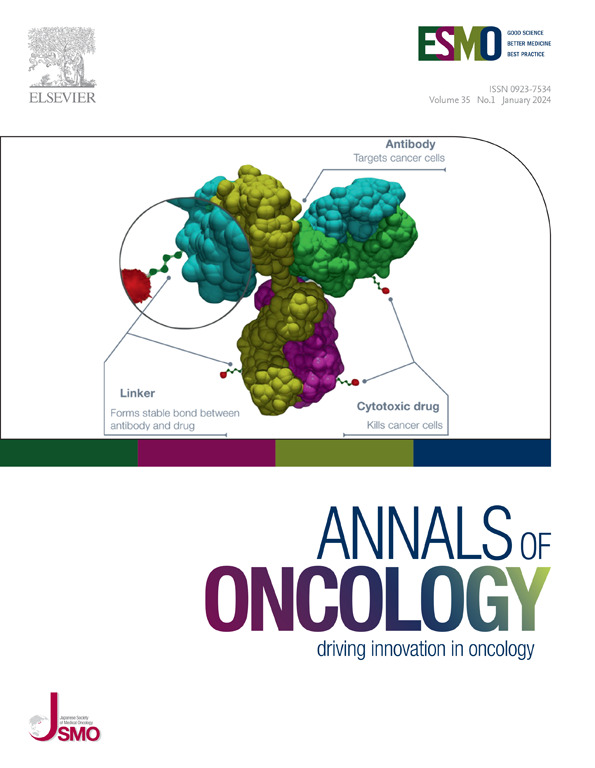A phase III trial of adjuvant ribociclib plus endocrine therapy versus endocrine therapy alone in patients with HR-positive/HER2-negative early breast cancer: final invasive disease-free survival results from the NATALEE trial
IF 56.7
1区 医学
Q1 ONCOLOGY
引用次数: 0
Abstract
Background
NATALEE assessed efficacy and tolerability of 3 years of adjuvant ribociclib plus a nonsteroidal aromatase inhibitor (NSAI) compared with an NSAI alone in a broad population of patients with hormone receptor (HR)-positive/human epidermal growth factor 2 (HER2)-negative early breast cancer, including a select group without nodal involvement. This is the final preplanned analysis of invasive disease-free survival (iDFS).
Patients and methods
Premenopausal/postmenopausal women and men were randomized 1 : 1 to ribociclib (n = 2549; 400 mg/day, 3 weeks on/1 week off for 36 months) plus NSAI (letrozole 2.5 mg/day or anastrozole 1 mg/day for 60 months) or NSAI alone (n = 2552). Men and premenopausal women also received goserelin (3.6 mg once every 28 days). Patients had anatomical stage IIA (N0 with additional risk factors or N1), IIB, or III disease. The primary endpoint was iDFS. Secondary efficacy endpoints were recurrence-free survival (RFS), distant DFS, and overall survival. This final iDFS analysis was planned after ∼500 events.
Results
At data cut-off (21 July 2023), ribociclib was stopped for 1996 patients (78.3%); 1091 (42.8%) completed 3 years of ribociclib, and ribociclib treatment was ongoing for 528 (20.7%). Median follow-up for iDFS was 33.3 months. Overall, 226 and 283 iDFS events occurred with ribociclib plus NSAI versus NSAI alone, respectively. Ribociclib plus NSAI demonstrated significant iDFS benefit over NSAI alone [hazard ratio 0.749, 95% confidence interval (CI) 0.628-0.892; P = 0.0012]. The 3-year iDFS rates were 90.7% (95% CI 89.3% to 91.8%) versus 87.6% (95% CI 86.1% to 88.9%). A consistent benefit was observed across prespecified subgroups, including stage (II/III) and nodal status (positive/negative). Distant DFS and RFS favored ribociclib plus NSAI. Overall survival data were immature. No new safety signals were observed.
Conclusions
With longer follow-up and most patients off ribociclib, NATALEE continues to demonstrate iDFS benefit with ribociclib plus NSAI over NSAI alone in the overall population and across key subgroups. Observed adverse events remained stable.
HR+/HER2-早期乳腺癌患者辅助利波昔单抗加内分泌治疗与单纯内分泌治疗的III期试验:NATALEE试验的最终侵袭性无病生存期结果。
背景NATALEE评估了在广泛的HR+/HER2-早期乳腺癌患者(包括部分无结节累及的患者)中,与单用非甾体类芳香化酶抑制剂(NSAI)相比,辅助治疗3年的ribociclib加NSAI的疗效和耐受性。这是对侵袭性无病生存期(iDFS)的最终预案分析:绝经前/绝经后女性和男性按1:1随机分配到ribociclib(n=2549;400毫克/天,开/关各3周,持续36个月)加非甾体抗炎药(来曲唑2.5毫克/天或阿那曲唑1毫克/天,持续60个月)或单用非甾体抗炎药(n=2552)。男性和绝经前女性也接受戈舍瑞林治疗(3.6 毫克,每 28 天一次)。患者的疾病为解剖学 IIA 期(N0,伴有其他危险因素或 N1)、IIB 期或 III 期。主要终点是iDFS。次要疗效终点为无复发生存期(RFS)、远期DFS(DDFS)和总生存期(OS)。最终的iDFS分析是在≈500例事件后进行的:在数据截止日(2023年7月21日),1996名患者(78.3%)停止了利福昔布治疗;1091名患者(42.8%)完成了3年的利福昔布治疗,528名患者(20.7%)仍在接受利福昔布治疗。iDFS 的中位随访时间为 33.3 个月。总体而言,利福昔布联合非甾体抗炎药与单独使用非甾体抗炎药相比,分别发生了226例和283例iDFS事件。与单用 NSAI 相比,Ribociclib 加 NSAI 有显著的 iDFS 益处(危险比 0.749,95% 置信区间 [CI] 0.628-0.892;P=0.0012)。3 年 iDFS 率为 90.7% (95% CI 89.3%-91.8%) vs 87.6% (95% CI 86.1%-88.9%) 。在包括分期(II/III)和结节状态(+/-)在内的预设亚组中观察到了一致的获益。DDFS和RFS均优于ribociclib加NSAI。OS数据尚不成熟。未观察到新的安全性信号:结论:随着随访时间的延长和大多数患者停用利博昔单抗,NATALEE继续证明,在总体人群和关键亚组中,利博昔单抗加NSAI比单用NSAI更有利于iDFS。观察到的不良事件保持稳定。
本文章由计算机程序翻译,如有差异,请以英文原文为准。
求助全文
约1分钟内获得全文
求助全文
来源期刊

Annals of Oncology
医学-肿瘤学
CiteScore
63.90
自引率
1.00%
发文量
3712
审稿时长
2-3 weeks
期刊介绍:
Annals of Oncology, the official journal of the European Society for Medical Oncology and the Japanese Society of Medical Oncology, offers rapid and efficient peer-reviewed publications on innovative cancer treatments and translational research in oncology and precision medicine.
The journal primarily focuses on areas such as systemic anticancer therapy, with a specific emphasis on molecular targeted agents and new immune therapies. We also welcome randomized trials, including negative results, as well as top-level guidelines. Additionally, we encourage submissions in emerging fields that are crucial to personalized medicine, such as molecular pathology, bioinformatics, modern statistics, and biotechnologies. Manuscripts related to radiotherapy, surgery, and pediatrics will be considered if they demonstrate a clear interaction with any of the aforementioned fields or if they present groundbreaking findings.
Our international editorial board comprises renowned experts who are leaders in their respective fields. Through Annals of Oncology, we strive to provide the most effective communication on the dynamic and ever-evolving global oncology landscape.
 求助内容:
求助内容: 应助结果提醒方式:
应助结果提醒方式:


